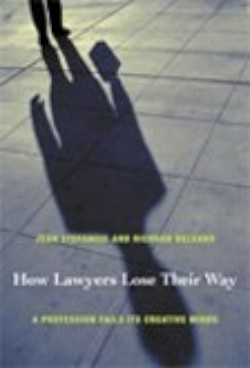How Lawyers Lost Their Way
A Profession Fails Its Creative Minds
Why are lawyers so miserable? Why the sky-high rate of burnout, job dissatisfaction, divorce, depression, suicide, and drug and alcohol addiction? Is it because of the incredible pressures of their job, from exorbitant demands for billable hours, crushing workloads, and a poor public image? Or are those merely the symptoms of a much deeper-rooted problem with the way lawyers are educated and impelled to practice?
Whatever their motivations, every year, about 40,000 lawyers leave the profession for another field, and countless others seriously contemplate the move.
Unhappy lawyers do not need to continue in an unhappy profession, say the authors. By examining the lives of two prominent men from the recent past, Stefancic and Delgado believe they have discovered the crux of lawyer dissatisfaction and offer a “life preserver” for lawyers seeking a better practice.
The authors, leading commentators on the state of American jurisprudence, are both professors at University of Pittsburgh School of Law. They have written and edited numerous books together, including Understanding Words that Wound, Critical Race Theory: An Introduction, and No Mercy: How Conservative Think Tanks and Foundations Changed America’s Social Agenda.
Legal formalism, they contend, lies at the heart of the problem. Legal education and practice have made the practice of law dull. Handling a case requires lawyers to cull through hundreds of past case decisions in an effort to discern what some other court decided long ago in a passably similar case. Important societal changes since then, or other possible favorable methodologies, have little relevance. The creative or liberal arts-educated minds who are drawn to the law find themselves constrained to exalt precedence and rigid formalism above all else, which eventually causes overwhelming job dissatisfaction.
During the early-to-mid-twentieth century, Ezra Pound was America’s foremost modernist poet, and Archibald MacLeish was a successful lawyer who left his profession in favor of writing poetry and later became a dedicated public servant. By examining forty years of correspondence between the two men, the authors posit that the aristocratic MacLeish benefited from the intellectual influences of his flamboyant, Bohemian friend and mentor, while Pound, who found himself institutionalized on treason and insanity charges after World War II, became indebted to MacLeish for his eventual freedom. By juxtaposing the lives and travails of these two very different thinkers, the authors paint a backdrop from which current lawyers can seek salvation from their own predicaments. This clever technique provides an intriguing perspective of how formalism is killing the profession, and what today’s lawyers can do about it.
This book throws a lifeline to any lawyer who finds the practice of law tedious, exasperating, or overwhelming. The practicing attorney simply needs to grasp that lifeline by reading this book and taking the authors’ lessons to heart.
Reviewed by
Alan J. Couture
Disclosure: This article is not an endorsement, but a review. The publisher of this book provided free copies of the book to have their book reviewed by a professional reviewer. No fee was paid by the publisher for this review. Foreword Reviews only recommends books that we love. Foreword Magazine, Inc. is disclosing this in accordance with the Federal Trade Commission’s 16 CFR, Part 255.

